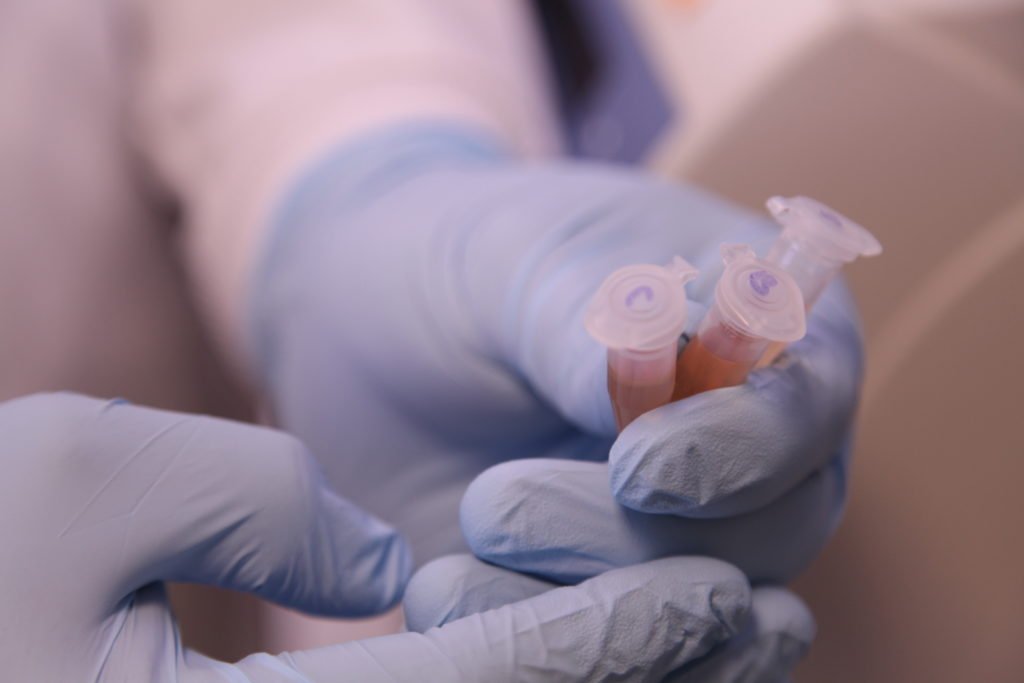Resistance in Ovarian Cancer
Ovarian Cancer Awareness Month
This month is Ovarian Cancer Awareness Month. In the UK each year, around 7,300 women are diagnosed with ovarian cancer, making it the sixth most common cancer type in females. Here at the Barts Cancer Institute, our researchers are working to better understand the biology of ovarian cancer and translate this knowledge into new diagnostic and treatment strategies. One particular focus of our ovarian cancer research is understanding and combating the development of resistance to therapy, which is a major obstacle in the successful treatment of many cancer types.
Tackling resistance to therapy
Dr Michelle Lockley from our Centre for Molecular Oncology is a Medical Oncologist specialising in the treatment of ovarian cancer. Supported by Cancer Research UK and Barts Charity, Dr Lockley and her team are using a variety of different approaches to tackle chemotherapy resistance in ovarian cancer. The Lockley team have created a unique range of novel cell line models of chemotherapy-resistant ovarian cancer, which they have used to develop and test several biological agents, including viruses, which can combat ovarian cancer. Dr Lockley’s group have also found that many existing drugs that were initially marketed for a range of diseases, actually have anti-cancer activity. They are currently re-purposing these agents for use either as single agents or in combination with anti-cancer viruses and chemotherapy.

Since drug resistance is extremely common, the Lockley team is interested in understanding the evolution of resistance to anti-cancer treatments. This has enabled them to devise personalised therapeutic regimens that are adapted to the evolutionary fitness costs inherent in chemo-resistant cancers. These new adaptive therapy regimens are currently being tested in her laboratory.
Dr Lockley set up and continues to lead the Barts Gynae Tissue Bank, a repository of tissues and clinical data that are kindly donated by ovarian cancer patients. This resource is essential to the preclinical development Dr Lockley's newly discovered therapies and also ensures that the translational research conducted by Dr Lockley and her collaborators reflects the group of patients she treats.
Chromosomal instability and chemotherapy resistance
Supported by Wellbeing of Women, Dr Sarah McClelland and her team, also from our Centre for Molecular Oncology, are investigating chromosomal instability (a defect that involves loss or rearrangement of a cell’s genetic material) in ovarian cancer and whether this trait is linked to the development of chemotherapy resistance.
Dr McClelland explained: “Ovarian cancer cells continually reshuffle the order and content of their genome. It is thought that this reshuffling ability can help ovarian tumours to develop resistance to chemotherapy, which is a major cause of death in ovarian cancer patients. Our lab is working to understand the exact ways in which ovarian cancer cells reshuffle their genome, using careful analysis of cells isolated from tumours and grown in the laboratory. We are also testing whether, by restraining genome reshuffling, we can limit the ability of cancer cells to develop resistance to chemotherapy drugs. This information could be used to design new approaches to treating ovarian cancer patients in the future.”
Wellbeing of Women Chief Executive, Janet Lindsay said: “Wellbeing of Women is very excited to be funding Dr Sarah McClelland’s pioneering research analysing chromosome instability in ovarian cancer cells. This is the first in-depth study of its kind. One of the most distressing aspects of ovarian cancer is its ability to become resistant to chemotherapy over time. Dr McClelland's work is an exciting new approach that could lay the foundations for a much-needed new treatment for women with this terrible disease, potentially saving thousands of lives.”
Although ovarian cancer survival has almost doubled in the last 40 years in the UK, approximately 4,100 women still lose their lives to this cancer each year. Women are often diagnosed once the cancer has already spread to other parts of the body, and in 1 in 5 cases ovarian cancer is diagnosed too late for treatment to be option. It is therefore vital to raise awareness of the symptoms of this cancer type so that it can be diagnosed as early as possible.
With the help of our supporters, we are committed to ensuring that we continue to push the boundaries of cancer research to improve our understanding of ovarian cancer and identify innovative and efficacious treatments that can help those affected by this cancer type.
- Thank you to our funders for your continued support of our ovarian cancer research -
Category: General News

No comments yet